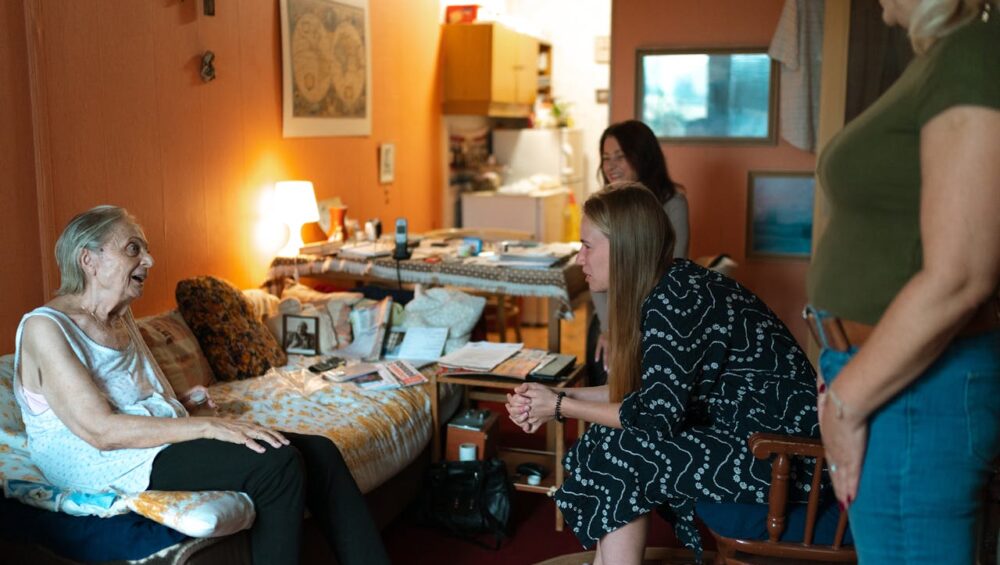Making the decision to start hospice care can be incredibly emotional, but it’s often one of the most compassionate choices a family can make. Many people delay hospice because they aren’t sure when the “right time” is, or they associate it with giving up hope. In reality, hospice care is about maximizing comfort, preserving dignity, and enhancing quality of life during the final stages of a serious illness.
In this post, we’ll explore the signs that it may be time to consider in-home hospice care and explain how to know when to start hospice care for your loved one.
Understanding Hospice Care
Hospice care is a specialized form of medical support designed for individuals who have a terminal illness and are no longer seeking curative treatment. In-home hospice allows patients to remain in a familiar, comforting environment while receiving comprehensive care that focuses on symptom relief, emotional support, and spiritual well-being.
Eligibility for hospice care typically begins when a physician certifies that a patient has a life expectancy of six months or less if the illness follows its expected course.
Why Families Delay Hospice—and Why So Many Regret It
It’s common for families to wait until the final days or weeks of life to consider hospice. However, studies show that patients who begin hospice earlier experience better symptom management, fewer hospitalizations, and greater emotional support.
Recognizing the signs early can help your loved one benefit from hospice full range of services. These signs don’t mean giving up; they mean shifting focus from cure to comfort.
1. Frequent Hospitalizations or ER Visits
If your loved one has been in and out of the hospital or emergency room multiple times over a few months, it may indicate that the disease is progressing and harder to manage. Hospice can help minimize these stressful trips by providing care and symptom relief at home.
2. Uncontrolled Pain or Symptoms
When pain, nausea, shortness of breath, fatigue, or other symptoms are no longer effectively managed through conventional medical treatments, hospice care can offer powerful comfort-based approaches. Hospice nurses are trained to recognize and treat complex symptoms quickly and compassionately.
3. Rapid Decline in Physical Function
If your loved one is having increasing difficulty with everyday tasks like walking, eating, bathing, or dressing—even with assistance—it may be time to consider hospice. A noticeable decline in mobility, speech, or cognition are common signs of disease progression.
4. Increased Time Spent Sleeping or Bedridden
As the body begins to slow down, patients often sleep much more and may spend most of the day in bed. This natural shift can be a sign that hospice support would be beneficial. Hospice teams help ensure the patient remains comfortable and well cared for during this stage.
5. Progressive Weight Loss or Difficulty Eating
When someone loses their appetite or begins to have trouble swallowing, chewing, or digesting food, it may be a sign that the body is entering the final stages of life. Hospice professionals offer nutritional support and guidance on how to provide comfort without forcing meals.
6. Confusion, Anxiety, or Withdrawal
Cognitive or emotional changes such as confusion, agitation, restlessness, or social withdrawal are common signs that a person is nearing the end of life. Hospice teams include social workers and chaplains who help manage these emotional and spiritual transitions with grace and compassion.
7. Diagnosis of a Life-Limiting Illness
Certain illnesses—such as late-stage cancer, congestive heart failure, advanced dementia, COPD, ALS, or liver/kidney failure—often progress to a point where curative treatments are no longer effective. If doctors have said, “There’s nothing more we can do to stop the disease,” it’s a signal to shift the goal of care from curing to comforting.
8. The Patient or Family Is Asking “How Much Time Is Left?”
When you start asking this question, it often means that your family is emotionally ready to prepare for the next stage. Starting hospice at this point gives you access to medical guidance, emotional support, and spiritual hospice care to help your loved one make a peaceful transition.
The Benefits of Starting Hospice Early
Hospice is not just for the final days or hours. In fact, the earlier hospice begins, the more support your loved one and your family can receive:
Better symptom control
Fewer hospital visits
24/7 nursing support
Emotional and spiritual counseling
Assistance with personal care and household tasks
Respite care for family caregivers
Grief and bereavement support
In-home hospice ensures that care happens where your loved one feels safest and most at peace.
Final Thoughts
Recognizing when it’s time to start hospice care is never easy, but it can bring tremendous relief and comfort during one of life’s most challenging times. If your loved one is showing any of the signs listed above, it may be time to speak with their doctor or reach out to hospice care in Portland for an evaluation.
Hospice isn’t about giving up—it’s about choosing compassionate care, preserving dignity, and making every moment count. By starting hospice early, you give your loved one the chance to live their final days with comfort, respect, and the support they deserve.
If you’re in the Portland area and considering in-home hospice care, VistaRiver Hospice is available to guide you through the process and help you understand your options. Don’t wait for a crisis—reach out and learn how VistaRiver hospice can help. Schedule consultation or Call 503-542-7090 to learn more about VistaRiver In-home hospice care.



